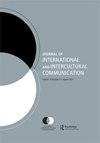Working across languages/cultures in international and environmental communication fieldwork
IF 2.2
Q2 COMMUNICATION
Journal of International and Intercultural Communication
Pub Date : 2020-12-02
DOI:10.1080/17513057.2020.1850844
引用次数: 10
Abstract
ABSTRACT As environmental communication grows as an area of study, international and environmental justice issues increasingly need attention. Sustainability, climate change, habitat erosion, water access, and a number of other issues disproportionately affect rural and marginalized communities around the globe. For researchers working in and with such communities, the ethics of interviewing local and/or non-academic people requires much thought and consideration. One of the authors has worked in Indonesian and Spanish, and the other in Hindi, Nepali, and Bengali. Questions such as what voice means, in relationship to postcolonial/decolonial theories, are especially important. Furthermore, how such interviews are recorded, transcribed, and then translated also raise significant ethical considerations. This paper explores how environmental communication researchers might rethink approaches to ethnography and interviews across cultures, languages, and other aspects of difference.在国际和环境交流领域跨语言/文化工作
随着环境传播作为一个研究领域的发展,国际和环境正义问题越来越需要关注。可持续性、气候变化、栖息地侵蚀、水资源获取和许多其他问题对全球农村和边缘化社区的影响尤为严重。对于在这样的社区工作或与之合作的研究人员来说,采访当地和/或非学术人士的道德规范需要深思熟虑。其中一位作者用印尼语和西班牙语工作,另一位用印地语、尼泊尔语和孟加拉语工作。诸如与后殖民/非殖民理论相关的声音意味着什么等问题尤为重要。此外,如何记录、转录和翻译这些访谈也引起了重大的伦理考虑。本文探讨了环境传播学研究人员如何重新思考跨文化、语言和其他差异方面的民族志和访谈方法。
本文章由计算机程序翻译,如有差异,请以英文原文为准。
求助全文
约1分钟内获得全文
求助全文
来源期刊

Journal of International and Intercultural Communication
COMMUNICATION-
CiteScore
3.80
自引率
12.50%
发文量
19
 求助内容:
求助内容: 应助结果提醒方式:
应助结果提醒方式:


